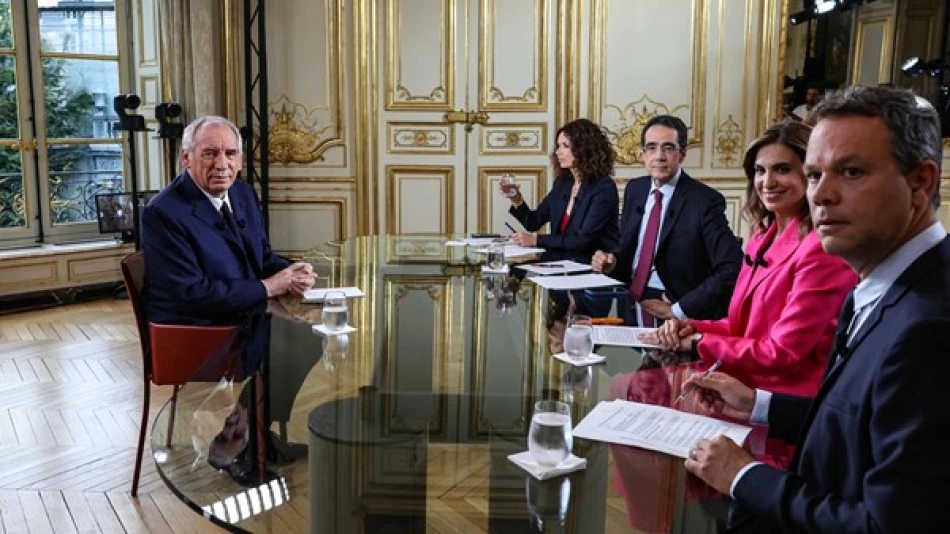
Bayrou: Vote of Confidence in His Government to Determine France's Fate
France's Government Faces Inevitable Collapse as Debt Crisis Deepens Political Paralysis
French Prime Minister François Bayrou is fighting a losing battle to save his government, with opposition parties from both left and right united in their determination to bring down his administration in a no-confidence vote scheduled for September 8. The political crisis threatens to plunge France deeper into fiscal uncertainty at a time when the country desperately needs decisive action to address its mounting debt burden.
A Prime Minister's Last Stand
In a televised interview across four news channels on Sunday, Bayrou framed the upcoming vote as a choice about France's future direction rather than his personal political survival. "If the government falls as they hope and as they announce, it means we will change our policy," he warned, suggesting France would abandon what he considers vital reforms in favor of a "more lenient and drifting" approach.
The defiant tone reflects Bayrou's awareness that his coalition government—formed through an alliance between centrist and right-wing parties—lacks the parliamentary arithmetic to survive. Both the far-left and far-right have confirmed they will vote to withdraw confidence, making the government's fall virtually certain.
The Stakes Beyond Politics
Bayrou, who took office in December, has made debt reduction and achieving a balanced budget by 2026 central to his administration's agenda. His warning that "almost all French people fully understand that any country drowning in debt is a country that has lost its sovereignty and freedom" echoes concerns that have plagued eurozone economies since the 2010 debt crisis.
France's Fiscal Reality Check
The urgency of France's situation was underscored by Pierre Moscovici, head of the Court of Auditors, who emphasized Sunday that "France needs a budget within deadlines" given a financial situation that is "not critical but certainly worrying." This assessment reflects France's precarious position as the eurozone's second-largest economy, where political instability could trigger broader market concerns about European fiscal stability.
Political Fragmentation Deepens Crisis
The political deadlock illustrates how France's fragmented parliament—a result of inconclusive elections—has made governance nearly impossible. Socialist Party leader Olivier Faure's declaration that the decision to withdraw confidence is "irreversible" demonstrates how opposition parties are prioritizing political advantage over fiscal responsibility.
Bayrou's pointed question—"What does Olivier Faure want? Does he want to be in Matignon?"—reveals the personal ambitions driving the crisis, with opposition leaders positioning themselves for potential power while the country's finances deteriorate.
Market and International Implications
The impending government collapse comes at a particularly sensitive time for European markets, already grappling with economic uncertainty and rising borrowing costs. France's political instability could trigger the kind of sovereign debt concerns that previously affected Italy and Spain, potentially forcing the European Central Bank to intervene.
President Emmanuel Macron's support for Bayrou, expressed Friday in Toulon, may prove insufficient to prevent the crisis. Macron will face the challenging task of finding a new prime minister capable of navigating the same parliamentary obstacles that have doomed Bayrou's administration.
A Pattern of European Governance Challenges
France's predicament mirrors broader challenges facing European democracies, where coalition governments struggle to implement necessary but unpopular fiscal reforms. Unlike countries such as Germany, where coalition-building traditions provide more stability, France's presidential system creates particular tensions when the executive lacks clear parliamentary support.
The September 8 vote will likely usher in a new period of uncertainty, with France's ability to address its fiscal challenges becoming increasingly constrained by political paralysis. For a country that has historically prided itself on state capacity and dirigiste economic management, the current crisis represents a fundamental test of institutional resilience.
Most Viewed News

 Layla Al Mansoori
Layla Al Mansoori






